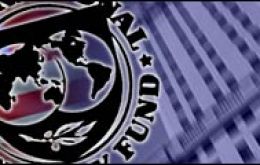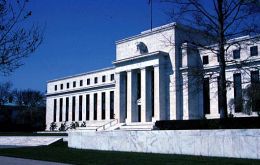MercoPress. South Atlantic News Agency
United States
-
Thursday, June 30th 2011 - 07:09 UTC
US daily calorie intake up 30% in 30 years: cut on snacks and king size portion

Snacking and super sizing are two of the dieter's worst enemies, research suggests. The average daily calorie intake in the US has increased by almost a third in 30 years, reaching 2,374 kilocalories.
-
Thursday, June 30th 2011 - 06:58 UTC
IMF urges a political agreement on the US federal debt ceiling

Failure by US lawmakers to agree soon on a deal to raise the government's borrowing limit could deliver a “severe shock” to a still fragile recovery and global markets, the International Monetary Fund warned.
-
Wednesday, June 29th 2011 - 16:26 UTC
US latest wars have cost the Treasury 4.4 trillion USD, says academic report

United States President Barack Obama cited cost as a reason to bring troops home from Afghanistan and referred to a one trillion US dollars price tag for US wars. The figure grossly underestimates the total cost of wars in Iraq, Afghanistan and Pakistan to the US Treasury and ignores more imposing costs yet to come, according to a study released Wednesday.
-
Monday, June 27th 2011 - 18:48 UTC
Federal Reserve will remain biggest buyer of US Treasury bills

The Federal Reserve will remain the biggest buyer of Treasuries, even after the second round of quantitative easing ends this week, as the central bank uses its 2.86 trillion US dollars balance sheet to keep interest rates low.
-
Monday, June 27th 2011 - 16:48 UTC
US consumer spending flat in May reflecting a fall in auto sales

Consumer spending in the United States was unchanged in May for the first time in almost a year, likely reflecting a plunge in auto sales, according to a US government report, that also showed a build-up in underlying inflation pressures.
-
Saturday, June 25th 2011 - 10:17 UTC
Great victory for gay rights movement: New York legalizes same-sex marriage

New York lawmakers narrowly voted to legalize same-sex marriage Friday, handing activists a breakthrough victory in the state where the gay rights movement was born. New York thus becomes the sixth state in the US where gay couples can wed and the biggest by far.
-
Friday, June 24th 2011 - 22:44 UTC
US economy expanded at a 1.9% annual pace in the first quarter

The United States economy grew at a 1.9% pace in the first quarter marking the start of what Federal Reserve policy makers anticipate is a temporary slowdown in growth.
-
Thursday, June 23rd 2011 - 23:19 UTC
Release of strategic reserves (to counter Libya’s absence) rattles world oil market

Oil rose in New York, recovering from a plunge sparked by an International Energy Agency announcement that its members will release crude from strategic reserves.
-
Wednesday, June 22nd 2011 - 23:36 UTC
Fed admits it does not have a “precise read” of why US economy is slowing

The Federal Reserve has cut its growth forecast for the US economy in the face of the impact of higher energy prices. It now estimates that the US economy will expand between 2.7% and 2.9% this year, down from its April forecast of 3.1% to 3.3%.
-
Friday, June 17th 2011 - 06:03 UTC
US current account deficit up 6.3% spurred by imports of more expensive oil

The US current account deficit rose 6.3% to $119.3bn in the first three months of the year, the Commerce Department has said. Strong exports of cars, computers and machinery were offset by imports, particularly of more expensive oil.
